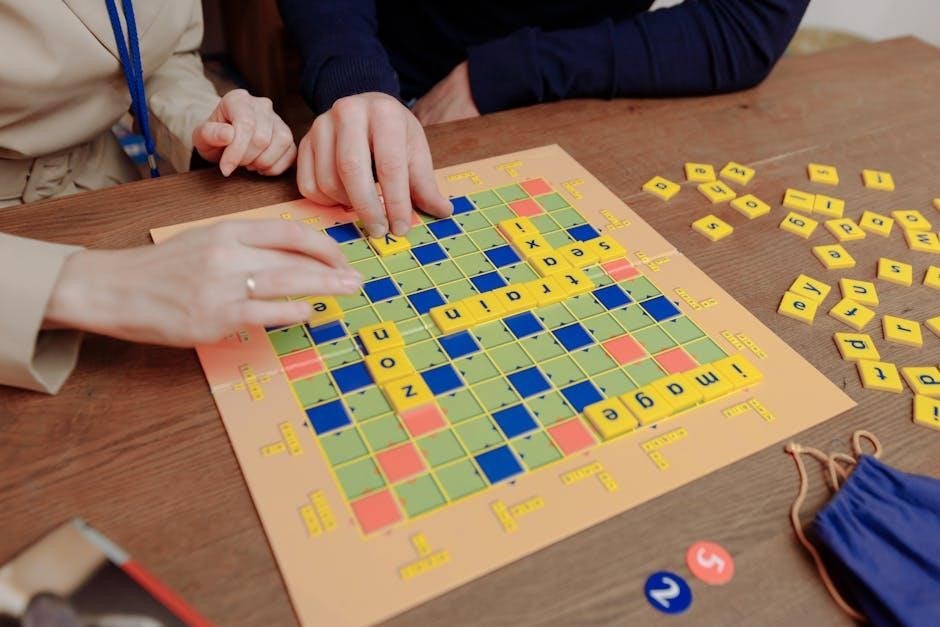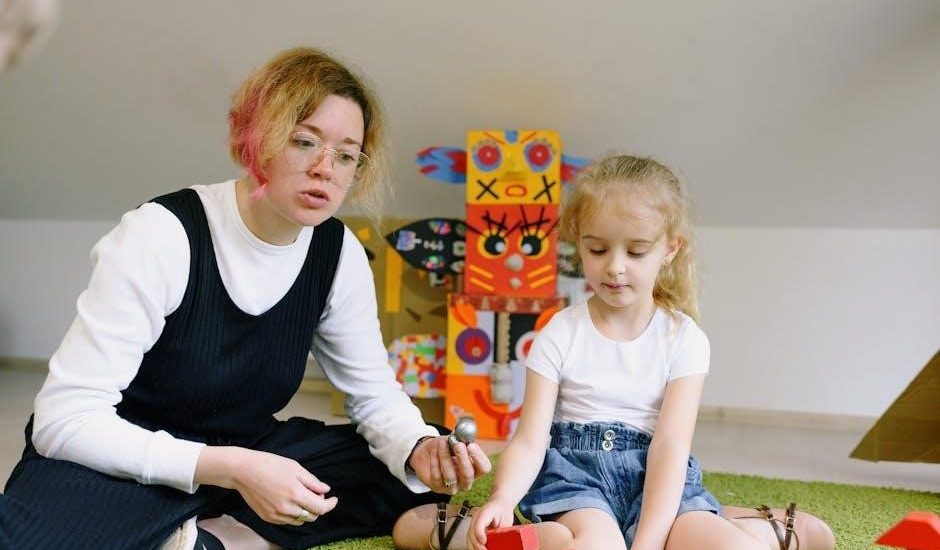Social skills are essential for effective communication and building strong relationships. They involve verbal and nonverbal cues, emotional intelligence, and active listening, crucial for personal and professional success.
Definition and Overview
Social skills refer to the abilities and competencies that enable individuals to effectively navigate and interact within social environments. They encompass a wide range of behaviors, including verbal communication, nonverbal cues, and emotional intelligence. These skills are essential for building relationships, resolving conflicts, and achieving personal and professional goals. Social skills are learned through interactions with others and are shaped by cultural, familial, and environmental factors. Effective social skills foster empathy, active listening, and cooperation, which are vital for successful communication and collaboration. Understanding and mastering these skills is crucial for individuals to thrive in both personal and professional settings, as they directly impact one’s ability to connect with others and achieve desired outcomes.

Why Social Skills Are Essential
Social skills are fundamental for fostering meaningful connections and achieving personal and professional success. They enable individuals to communicate effectively, build trust, and resolve conflicts, which are critical in all aspects of life. Strong social skills enhance collaboration, empathy, and understanding, leading to stronger relationships and improved mental health. In professional settings, these skills are vital for leadership, teamwork, and career advancement. Moreover, they help individuals navigate diverse social environments and adapt to changing expectations. Without robust social skills, miscommunications and misunderstandings can arise, hindering personal growth and societal integration. Thus, developing these skills is essential for individuals to thrive and contribute positively to their communities.

Importance of Social Skills
Social skills are vital for personal and professional success, enabling effective communication, relationship-building, and conflict resolution. They foster collaboration, empathy, and adaptability, essential for thriving in diverse environments.
Enhancing Communication
Effective communication is a cornerstone of social skills, enabling individuals to convey thoughts, emotions, and needs clearly. Verbal and nonverbal cues, such as tone, gestures, and eye contact, play a vital role in ensuring messages are understood. Social skills training often focuses on improvingthese abilities through structured activities like role-playing and group exercises. Resources such as social skills worksheets for adults PDF and therapeutic tools for children provide practical exercises to enhance conversation skills and interpret social cues. These materials are frequently integrated into educational curriculums, helping students master classroom expectations and peer interactions. By fostering clear and empathetic communication, individuals can build stronger connections and navigate social situations with confidence, which is essential for both personal and professional success.
Building Strong Relationships
Social skills are vital for forming and maintaining meaningful relationships. Effective communication, empathy, and understanding others’ perspectives foster trust and connection. Activities like role-playing and group counseling, often found in social skills PDF resources, help individuals practice these interactions. Caregivers and educators play a crucial role in modeling positive behaviors, while a supportive social climate encourages open dialogue. Emotional intelligence, a key component of social skills, enables individuals to navigate conflicts and build rapport. By mastering these abilities, people can create lasting relationships that enhance both personal and professional lives, fostering a sense of belonging and collaboration in diverse social settings.
Success in Professional Environments
Social skills are fundamental to thriving in professional environments, enabling individuals to collaborate effectively and build workplace relationships. Strong communication, emotional intelligence, and conflict resolution are key to achieving career goals. Resources like social skills PDF guides offer practical tools for adults to enhance these abilities, particularly for those with autism or intellectual disabilities preparing for employment. These materials address transition needs, such as peer interaction and emotional expression, which are critical in workplace settings. By fostering a supportive social climate, organizations can promote teamwork and productivity. Social skills training also equips professionals with the confidence to navigate leadership roles and maintain positive interactions, ensuring long-term success in their careers.

Components of Social Skills
Social skills include verbal communication, nonverbal cues, active listening, and emotional intelligence. These components are essential for effective interaction and are well-documented in social skills PDF resources.
Verbal Communication
Verbal communication involves the use of words to convey messages effectively. It is a core component of social skills, enabling individuals to express thoughts, needs, and emotions clearly. Social skills PDF resources emphasize the importance of articulate speech, tone, and choice of words in fostering understanding and building rapport. Effective verbal communication helps in navigating various social situations, from casual conversations to professional interactions. It also plays a role in conflict resolution and collaboration. By refining verbal skills, individuals can enhance their ability to connect with others and achieve their goals. This aspect is widely covered in educational materials and training programs focused on social development.
Nonverbal Cues
Nonverbal cues, such as body language, facial expressions, and eye contact, play a vital role in communication. They convey emotions, intentions, and attitudes without words. Social skills PDF resources highlight how these cues complement verbal communication, enhancing understanding and connection. Understanding nonverbal signals is crucial for interpreting social interactions accurately. Misinterpretations can lead to misunderstandings, while mastery fosters trust and rapport. PDF guides often include exercises to improve awareness and appropriate use of nonverbal communication, essential for both personal and professional environments. These tools emphasize the importance of aligning nonverbal cues with verbal messages for clear and effective interaction. Developing this skill is key to navigating diverse social situations successfully.
Active Listening
Active listening is a fundamental social skill that involves fully engaging with and comprehending others’ messages. It goes beyond hearing words, requiring attention, empathy, and understanding. Social skills PDF resources emphasize the importance of verbal and nonverbal cues, such as nodding, maintaining eye contact, and reflective responses, to show engagement. These tools often provide exercises to enhance listening skills, fostering clearer communication and stronger relationships. By actively listening, individuals can better interpret emotions, reduce misunderstandings, and build trust. PDF guides also highlight how this skill is taught through structured activities, making it accessible for both children and adults to improve their interpersonal interactions effectively. Developing active listening is key to fostering meaningful connections.
Emotional Intelligence
Emotional intelligence (EI) is the ability to recognize, understand, and manage one’s own emotions and those of others. It plays a vital role in social interactions, enabling individuals to empathize, communicate effectively, and maintain healthy relationships. Social skills PDF resources often emphasize EI as a cornerstone of interpersonal competence, providing exercises to enhance self-awareness, self-regulation, and empathy. These tools help individuals navigate complex emotional landscapes, whether in personal or professional environments. By fostering emotional intelligence, people can better understand others’ perspectives, resolve conflicts, and build trust. EI is particularly highlighted in interventions for conditions like autism, where emotional awareness is crucial for social success. Developing EI is essential for fostering meaningful and harmonious connections.

Methods of Social Skills Training
Methods include behavioral techniques, role-playing exercises, and structured learning activities. These approaches, often detailed in social skills PDF guides, enhance interpersonal effectiveness and practical skill development.
Behavioral Techniques
Behavioral techniques are a cornerstone of social skills training, focusing on observable and measurable actions. These methods, often outlined in social skills PDF resources, emphasize reinforcement strategies to encourage positive behaviors. Techniques such as token economies, where individuals earn rewards for desired actions, are commonly used. Behavioral interventions also incorporate modeling, where learners observe and imitate appropriate social interactions; Over time, these practices help individuals internalize skills, leading to sustained behavioral changes. Such approaches are particularly effective in structured environments, making them a popular choice for educators and therapists working with diverse populations, including those with autism or other developmental challenges. The goal is to create a supportive framework that fosters confidence and competence in social settings.
Learning Activities
Learning activities are structured experiences designed to enhance social skills through practice and engagement. These activities, often detailed in social skills PDF guides, include interactive exercises, group work, and hands-on tasks. For children, worksheets and games focus on understanding social cues, initiating conversations, and managing emotions. Adults benefit from role-playing scenarios that mimic real-life interactions, such as workplace communication or conflict resolution. Group counseling sessions, as highlighted in many resources, provide a safe space for practicing these skills collaboratively. These activities are tailored to individual needs, ensuring learners can apply what they learn in everyday situations. By fostering practical application, learning activities play a vital role in developing and refining social competence across all age groups.
Role-Playing Exercises
Role-playing exercises are interactive tools used to practice real-life social scenarios, fostering improved communication and problem-solving skills. These exercises, often outlined in social skills PDF guides, allow individuals to simulate conversations, workplace interactions, or conflict resolution. Participants act out roles, receive feedback, and refine their responses. For children, these activities help master basic interactions, while adults use them to navigate complex professional situations. Worksheets and scripts provided in such resources guide the process, ensuring focused learning. Role-playing builds confidence and adaptability, making it a cornerstone of social skills training. By replicating real-world challenges, these exercises prepare individuals to handle diverse social situations effectively, enhancing their interpersonal competence and emotional intelligence.

Role of Family and Environment
The family environment plays a crucial role in shaping social skills, with caregivers serving as role models. A supportive social climate fosters positive interactions and development, as outlined in social skills PDF guides.
Influence of Caregivers
Caregivers significantly influence the development of social skills by modeling appropriate behaviors and providing guidance. They help children interpret social cues, manage emotions, and develop empathy. Through consistent reinforcement and positive interactions, caregivers create a nurturing environment that fosters confidence and cooperation. Additionally, caregivers play a crucial role in teaching problem-solving skills and encouraging effective communication. Their attitudes and actions serve as examples, shaping a child’s understanding of social norms and expectations. Social skills PDF resources often emphasize the importance of caregiver involvement in promoting healthy social development and providing structured learning opportunities.
Impact of Social Climate
The social climate plays a pivotal role in shaping social skills, as it determines the quality of interactions and relationships within a group or environment. A positive social climate fosters cooperation, mutual respect, and open communication, while a negative one can lead to conflict and isolation. Research highlights that children in supportive environments develop better social cues and conflict-resolution skills. The social climate also influences emotional expression and empathy, as individuals adapt to the norms and expectations of their surroundings. Social skills PDF resources often emphasize the importance of creating a nurturing climate to enhance learning and interpersonal growth, particularly in educational and therapeutic settings.

Social Skills in Education
Social skills are integrated into education through curriculum design, classroom expectations, and peer interaction management. Resources like social skills PDF worksheets support teachers in fostering these abilities effectively.
Curriculum Integration
Curriculum integration of social skills ensures they are taught alongside academic subjects. Schools use structured programs and PDF resources to embed these skills into daily lessons, promoting holistic development. Activities like group projects and role-playing foster collaboration and empathy. Teachers adapt curricula to address specific needs, ensuring students grasp essential interpersonal competencies. This approach helps students apply social skills in real-life scenarios, preparing them for future interactions. By incorporating these elements, education systems create a supportive environment for social growth and academic success.
Classroom Expectations
Classroom expectations play a vital role in teaching social skills, as they provide a structured environment for learning. Teachers use PDF resources and activities to outline clear behavioral guidelines, fostering respect and cooperation. These expectations are integrated into daily routines, ensuring students understand and practice skills like sharing, listening, and conflict resolution. Role-playing and group projects are common methods to reinforce these norms. By establishing consistent expectations, educators help students develop self-awareness and responsibility, which are key components of social competence. This structured approach ensures that social skills are not just taught but also consistently applied, promoting a positive classroom culture.
Peer Interaction Management
Managing peer interactions is crucial for fostering positive social dynamics. Teachers use structured activities and PDF resources to guide students in cooperation and conflict resolution. These strategies, often implemented through group counseling and role-playing, help students navigate friendships and shared responsibilities. By addressing emotional expression and empathy, educators promote a supportive environment. Clear expectations and modeled behaviors encourage respectful communication, reducing misunderstandings. Peer interaction management also includes teaching active listening and problem-solving skills, enabling students to handle disputes constructively. These practices not only enhance social competence but also create a harmonious classroom atmosphere, where collaboration and mutual respect thrive. This approach ensures that students develop the skills needed for lifelong positive relationships.

Resources for Teaching Social Skills
PDF worksheets for children and adult-focused guides provide structured learning. Group counseling activities and therapeutic tools help develop social cues, communication, and emotional intelligence effectively.
PDF Worksheets for Children
PDF worksheets are a popular resource for teaching social skills to children. These materials are designed to help kids learn essential interpersonal skills through structured activities. They often focus on topics like understanding emotions, initiating conversations, and interpreting social cues. Many worksheets are created by educators and therapists, ensuring they are both effective and age-appropriate. Parents and teachers can easily download these PDFs, making them a convenient tool for home or classroom use. The interactive nature of these worksheets engages children and helps them practice skills in a fun and non-intimidating way. They are particularly useful for children with special needs, such as those on the autism spectrum, who may require extra support in developing social competencies. By using these resources, caregivers can help children build confidence and improve their ability to interact positively with peers and adults alike. These worksheets are a valuable addition to any social skills development program, offering a clear and accessible path to better communication and relationship-building abilities.
Adult-Focused Guides
Adult-focused guides on social skills are tailored to help individuals enhance their interpersonal abilities, particularly in professional and personal contexts. These resources often address challenges like workplace communication, conflict resolution, and networking. Many guides are designed for adults with specific needs, such as those on the autism spectrum or with intellectual disabilities, preparing them for employment. They include practical strategies, real-life examples, and exercises to improve emotional intelligence and relationship-building. These guides emphasize the importance of verbal and nonverbal communication, active listening, and empathy. By focusing on adult-specific scenarios, they provide relevant tools for navigating complex social environments. They are widely used in counseling and professional development programs, offering a structured approach to improving social competence and confidence in adults of all backgrounds.
Group Counseling Activities
Group counseling activities are effective tools for fostering social skills in a collaborative environment. These activities often involve role-playing, problem-solving tasks, and open discussions, allowing participants to practice interpersonal communication and empathy. Many guides and resources, such as “Friendship Skills Group For Small Group Counseling,” provide no-prep lessons and exercises tailored for group settings. These activities help individuals learn to navigate social interactions, manage conflicts, and build trust. Worksheets and therapeutic exercises focus on specific skills like conversation starters, active listening, and emotional expression. Group counseling also addresses peer interaction management, enabling participants to apply skills in real-life situations. By fostering a supportive environment, these activities promote confidence and competence in social interactions, making them a valuable component of social skills development programs for both children and adults.

Case Studies and Research
Research highlights interventions for adults with Autism Spectrum Disorder, Latino kindergartners’ social skills, and talented students’ social competence, providing insights into diverse developmental needs and strategies.
Autism Spectrum Disorder Interventions
Social skills training is crucial for individuals with Autism Spectrum Disorder (ASD), enabling them to effectively navigate social interactions and build meaningful relationships. Evidence-based methods, such as applied behavior analysis (ABA) and social skills groups, have been widely implemented to address communication challenges. These interventions often incorporate role-playing exercises, visual aids, and positive reinforcement to enhance both verbal and nonverbal communication. Research indicates that such structured programs lead to significant improvements in emotional intelligence and problem-solving abilities, which are essential for daily interactions. Furthermore, these interventions are tailored to address the unique needs of each individual, ensuring a personalized approach to learning and development. Overall, consistent and well-designed social skills training can greatly enhance the quality of life for individuals with ASD, fostering independence and successful integration into various social and professional environments.
Latino Kindergartners’ Social Skills
Research indicates that most Latino kindergartners exhibit social skills comparable to their peers, highlighting their ability to adapt and interact effectively in diverse environments. Cultural background and socioeconomic factors play significant roles in shaping these skills, with family influences being particularly impactful. Early interventions and culturally responsive teaching strategies can further enhance their social development. These efforts help ensure that Latino kindergartners thrive socially, emotionally, and academically, laying a strong foundation for future success.
Talented Students’ Social Competence
Research shows that students in talented schools often exhibit higher levels of social competence compared to their peers. These students demonstrate strong communication skills, emotional intelligence, and the ability to collaborate effectively in group settings; Their overconfidence, while sometimes perceived as a challenge, often stems from their advanced cognitive abilities and social awareness. Social skills training and tailored interventions can further enhance their interpersonal abilities, fostering environments where they can thrive. These students’ social competence plays a crucial role in their academic and personal growth, emphasizing the importance of nurturing these skills to support their holistic development.

Overcoming Barriers
Overcoming barriers to social skills development involves addressing communication challenges, managing problem behaviors, and providing tailored interventions. Social environments and support systems play a crucial role.
Addressing Communication Needs
Addressing communication needs is vital for improving social skills, especially for individuals with speech or language challenges. Early identification of difficulties ensures timely interventions, such as speech therapy or social skills training. Using visual aids, like worksheets or activity guides, can help individuals understand and practice communication strategies. For instance, PDF resources for children often include exercises on initiating conversations or interpreting nonverbal cues. Tailored interventions, such as role-playing or group activities, can enhance these skills in both children and adults. Educators and caregivers play a critical role in fostering supportive environments where individuals feel comfortable practicing communication. Studies highlight the effectiveness of structured programs in addressing communication barriers, particularly for those with autism or other developmental challenges. These approaches not only improve interaction skills but also boost confidence and social engagement.
Managing Problem Behaviors
Managing problem behaviors is crucial for fostering positive social interactions. Techniques like positive reinforcement and redirection can help individuals replace disruptive actions with constructive ones. Understanding the triggers of problem behaviors, such as frustration or anxiety, allows for tailored interventions. Behavioral plans often include clear expectations and consequences, promoting self-regulation. Social skills training programs, including PDF worksheets, provide structured exercises to teach alternative behaviors. Group counseling activities also offer a supportive environment for practicing these skills. By addressing underlying causes and teaching adaptive strategies, individuals can learn to manage their behaviors effectively, leading to improved social functioning and relationships. These approaches are particularly beneficial for children and adults with developmental challenges, ensuring long-term behavioral and social growth.
Social skills are vital for personal and professional success, fostering communication, relationships, and emotional intelligence. Resources like PDF worksheets and guides support continuous development, ensuring future growth in social competence.
Social skills are essential for effective communication, building relationships, and achieving personal and professional success. Resources like PDF worksheets and guides provide practical tools for developing these skills. These materials cater to various age groups, from children to adults, offering structured activities and exercises. They focus on enhancing communication, emotional intelligence, and problem-solving abilities. Additionally, group counseling activities and role-playing exercises are effective methods for fostering social competence. The role of caregivers and educational environments in shaping social skills is significant, as they provide guidance and support. Addressing challenges like communication needs and problem behaviors is crucial for overall development. By utilizing these resources, individuals can improve their social interactions and achieve greater confidence in diverse settings.
Future Directions in Social Skills Development
Future advancements in social skills development will likely focus on integrating technology, such as AI-driven tools, to personalize learning experiences. There will be an increased emphasis on cultural sensitivity and adapting social skills training to diverse populations. Group counseling and peer interaction programs will continue to evolve, addressing specific needs like autism and intellectual disabilities. Neuroscientific research will play a key role in understanding the brain’s role in social interactions, informing more effective interventions. Additionally, the development of accessible digital resources, such as PDF worksheets and online platforms, will make social skills training more widely available. These innovations aim to foster inclusive environments and empower individuals to thrive socially in an ever-changing world.




